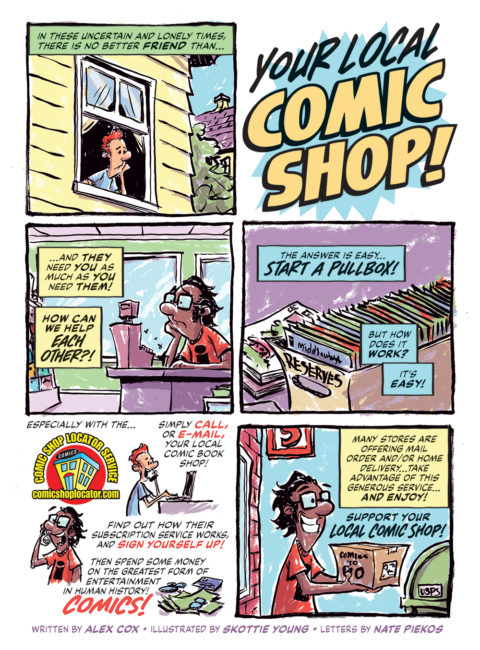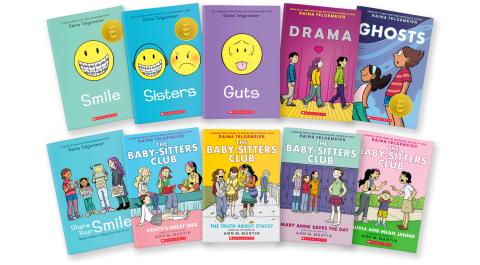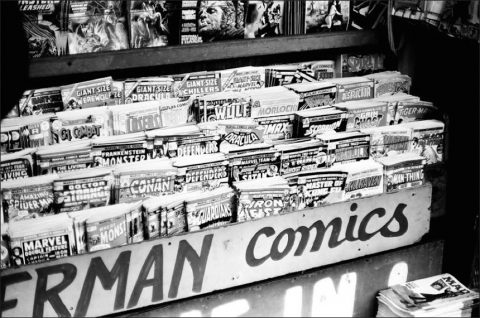This is not a column about collecting comics: this is about reading comics. I’ve been an avid comic reader for 34 years now and things have changed in the industry and in my life that affect how I buy comics.
I transitioned away from Marvel and DC because I was done with capes and my perceived value of the books was very low. Let me explain that last part: I was paying $4 for a comic that I was reading (text and images since comics are a melding or words and pictures) in about ten minutes. That put the entertainment cost of those comics at $24 per hour, which is high. I now read a lot of newspaper strip reprints and graphic novels from smaller publishers, whose entertainment cost per hour is much lower. A $50 newspaper strip reprint book is taking me about five hours to read, putting it at $10 per hour. A $20 graphic novel takes me about two hours to read, so the cost is again $10.
A few years before giving up Marvel and DC completely I switched to reading collected editions: I was tired of waiting for issues that were constantly delayed, so I’d wait for the trade or hardcover and get the whole story in one package. Unfortunately there isn’t much of a cost savings anymore, with five issue trade paperbacks costing as much or more than the single issues plus a $8-10 premium for hardcovers.
I also am married with three children and on a single income, so every dollar needs to be accounted for. I do side jobs to pay for this hobby, which makes every purchase even more distilled.
There isn’t any resale value in these books anymore, so that avenue is mostly closed. I can get 25% of a softcover’s price in trade at my local comic shop, which isn’t a bad deal and at least lets me carry forward the value.
That brings up another factor: re-readability, or will any book get a second or third reading thereby drastically lowering its entertainment cost. To be honest with myself I’ve probably read ten books twice within the last ten years.
This all came to mind because of an article on The Beat last week, How To Be A Comics Fan When You Can Barely Afford Them. The author made some good points and got me thinking. I didn’t want this column to be one long complaint, so here are some ways to read comics on a budget.
Let’s start with free. Your public library most likely has a good collection of comics, depending on the size of your city. Since every comic is now collected in a trade paperback you can read most everything for free if the library carries it. I live in a very small town and their comic section is about fourty titles.
Another route is the one I mentioned earlier, selling your old trades and buying used ones. Your local comic shop or used bookstore are excellent sources, but just like the library you’re limited to what they have.
An idea that’s bubbling in the back of my mind is a comic reading swap group, where people swap books with each other. Perhaps a group could be established through your local library, community center or Rotary/Lions Clubs. Meet up once a month, bring what you don’t need anymore and swap it with others for new reads.
There are discounts available for new books from online retailers like Amazon, so you could save about 35% off cover right there. Some local comic shops offer discounts for subscribers but that seems to be in the minority. That’s my route for buying and it’s served me well: a combination of a discount at my local comic shop and orders through Amazon.
So far all my talk has been about trades and hardcovers, as they’re carried by a variety of retail outlets. For readers of “floppies” or good ol’ 32 page comics your discount choices are severely limited, but your local comic shop is still the best bet. Most good shops will have a discount or bargain bin section where you can pick up books six months and older for $2-3 each, providing a slight deal. It will be all around cheaper to read trade paperbacks if you’re on a comic reading budget.
Finally, how about sharing those Marvel digital codes. If you’re not using them why not give them to people who could use them, again through a local community group or perhaps organized by your local comic shop. While not everyone has a tablet most people have at least one PC at home.
All my proposed solutions have a major obstacle: reading new material right away. If you’re lucky your library gets comics as they’re published, but that may not be the case. Brand new items will not be in a used section, and people most likely won’t want to trade something brand new. Sharing digital codes could get you new material, but a digital code can be shared once and a trade paperback can make it to ten or more readers before falling apart.




I’d also suggest that people check out Marvel Digital Comics Unlimited service. If you read a lot it is definitely the most economical way to check out superhero stuff ($70 per year). It doesn’t solve the getting to read it right away problem (newest issues are about 6 months old), but it is great value.
Very good article Scott. Most of the younger people I know today read digital and buy the trade if they really like the arc. I think floppies have a limited life span in the future as more and more people go digital. A 1967 dollar is worth around $13.60 in todays dollars, which would buy 3 books and some change. Back in 1967 when everyone was reading floppies, you could buy 8 books for $1 and have some change. Digital comics can be even cheaper than that today.
I was going to include it but since it’s a single publisher I didn’t. I also hear they’re pretty liberal with simultaneous logins so sharing an account may be an option…
Scott
a very good article , like you , I’ve read comics for about 40 years and only recently stopped buying all new comics . Except for AE , Jack Kirby Collector , and like you , reprints from IDW , Fantagraphics , the occasional DC archive or Marvel masterworks . the monies I save from new stuff I’m using to fill in holes from the late GA and early SA I need . this stuff has lots of great art by the masters and will retain its value , not that I’m buying them for their value ! I did try Marvels digital codes from my LCS owner where I did buy from , but , sad to say , I’m not a fan of Marvels’ new stuff at all , so I stopped reading that too ! all of the back issues I buy will take around 45 minutes to read , not bad for an original 10c price , eh ?
Scott, I think you’re doing it wrong…
firstly, calculating an ‘entertainment cost’ is a little clinical in my view.
Secondly, your calculation is based upon you reading a $4 book every 10 minutes for the rest of time?! which isn’t how it happens in reality.
If you buy the books you love by the creators you love from the store you love at the price displayed, not only are you likely to enjoy your strict 10 minutes of solid reading time… you’re also supporting the industry.
One hand washes the other.
In my view… I’m quite happy to buy a gorgeous floppy or trade or hardcover or large-format book if I’ll find some joy in it.
If I can afford it and want it, I’ll buy it and love it.
If I really want it but can’t afford it, I’ll figure out a way to get it down the line.
I buy books that contain sequential art because I love them, not because I need them.
Where’d all the fun go, man?
This is a difficult point in comic collecting.
I live in a small community. Digital comics can be cool, but I want to support my local comic book store; comics are my favourite medium, and I want the floppy to live. I want to be able to buy new comics without driving an hour and a half to the city or ordering everything online. I also, when looking at a comic book, spend more than 10 minutes if the art is gorgeous like in a Jae Lee comic.
I am a teacher who is lucky enough to work for a school that bought me several sets of graphic novels to teach sequential art as a medium (kind of using Scott McLeod’s awesome “Understanding Comics” as a textbook). And it’s turning kids who hadn’t read anything besides Archie before into fans of comics. We live in an exciting time, when comics are considered real literature.
But can your average teen actually devote enough money to seriously collect more than a few titles a month? Not on minimum wage, if he or she has a job.
Look, this is an expensive hobby. Undeniable. I’m 39 and can afford to collect comics. What the big companies need to consider is where are the readers going to come from once us older readers are gone. And the companies themselves are killing the floppy with crossovers meant for the “graphic novel” release, which are meant to really explode the pockets of us readers, but I think many of us just to drop a title because of the hassle.
I guess there’s no point here…I just love comics, and don’t want them to go away…
Hi Scott, I like your suggestion of a comic “swap group”, kind of like a book-readers’ club. And the idea of sharing digital download codes is helpful too, because I suspect many digital download codes go unused.
But I wonder how peeling a digital download sticker will impact a floppy’s value? For example, if I had a near mint 9.2 copy of Amazing Spider-man # 700 in first print and regular cover edition (“death” of Spider-Man) that is worth about $25, and I peeled the digital download sticker from it. How much will this diminish my 9.2 condition AMS #700? I never figured out if a peeled sticker will depreciate a modern comic’s value. Just curious about this.
I’ve never been to Swap Zone here in Toronto but I heard they have comics:
http://www.swapsity.ca/SwapZoneToronto
I said it before and I’ll say it again: The biggest problem with comics is a lack of a succession plan. People just don’t care enough to look further out.
You lost me at “supporting the industry” and “one hand washes the other”.
I think what Danny is trying to say is that the entertainment value does not end after 10 mins. Even comic readers are collectors to some degree. That is, I can’t imagine many readers just tossing their book in the trash after they’ve read it. Unlike watching a movie in the theater, they own the book, which can be further enjoyed in various ways after the initial reading.
Also, even though new comics don’t have the same kind of value as older books, there is an online market for them. Depending on the usual parameters (title, grade, run…) you may be able to recoup all or a part of the cost. And if you’re lucky to own a book like Batman#1, you’re way ahead. I always tell people that comics is a hobby where you’ll be able to pull your money back out if you know how to navigate the market.
But heck… you’re right. Comics are bloody expensive for what they are, but then so are Pokemon cards. It’s part of a bigger systemic problem that our political leaders refuse to address… or unable to change because the banks have so much power over them, but I digress. One thing comics can do is go back to being printed on newsprint and pass the savings on to us. Cheaper, lighter… everyone wins.
Whatever it is that I want to say, I’ll say it myself until what I say is said.
When I have said whatever it is that I wanted to say, consider it said.
You may say new and different sayings, but under no circumstance may you attempt to re-say what I said, like your sayings are better said than my sayings were said… as I said them.
If there are any new sayings to be said by me, I’ll say them myself until the new things that I want to say are said again like the things I’ve said already in my head.
That’s all I have to say about that.